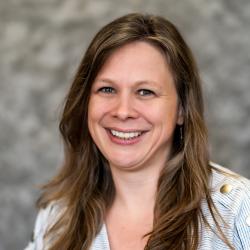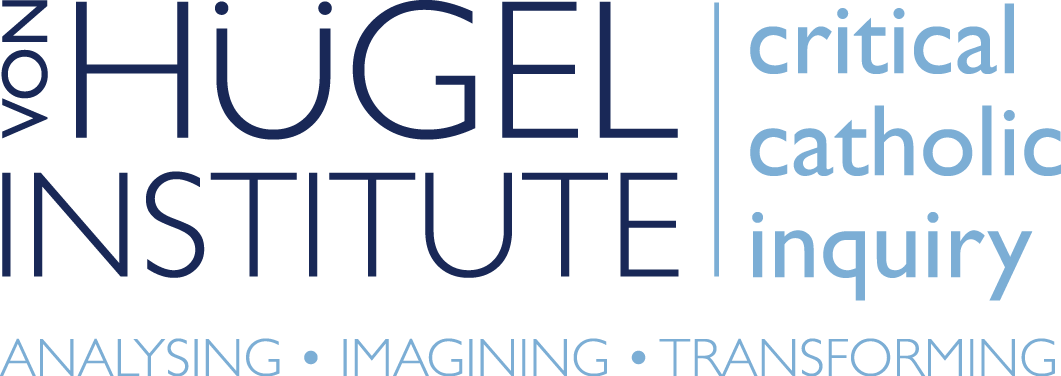Biography
Lorraine Krall McCrary is associate professor of political science at Wabash College, where she is department chair and teaches courses in political theory and the PPE major she helped develop. After serving as a visiting scholar at St. Edmund’s during the academic year 2023-2024, Lorraine has been appointed as a Research Associate to continue her work on disability and community at the VHI.
Lorraine earned her Ph.D. from Georgetown University where she wrote about Alexis de Tocqueville’s and John Stuart Mill’s conceptions of women as members of families and as political actors. Her work has been supported by grants from the National Endowment for the Humanities and the American Political Science Association, among other institutions. An advocate of community-engaged learning, Lorraine’s classes bring students outside the university to learn with people who have been excluded from colleges and universities, including people with cognitive disabilities and incarcerated people.
Research
Lorraine’s research focuses on what she calls “communities of care,” where people with and without disabilities live together in intentional community. She has conducted ethnographic research in Belgium, France, and Scotland, interviewing participants in communities of care, those with and without disabilities. Lorraine is drafting a monograph provisionally entitled, Care for Citizens: A New Political Theory of Cognitive Disability and Community. She is involved with the VHI’s project, Disability, Knowledge, and the University.
In addition, Lorraine writes about women and politics and politics and literature. She’s working on an article on Charlotte Perkins Gilman’s provocative novella, Benigna Machiavelli. Next up: Christine de Pizan as a founder, seeking to create political women.
Publications
- “Conversation as Political Education,” Perspectives in Political Science, 53.3 (2024): 164-175.
- With Gamble, Parker (Wabash ’23). “Disability and Subsidiarity: Addressing Social and Political Inclusion.” Intellectual Disabilities and Autism: Ethics and Practice. Springer, 2024: 165-175.
- “Bearing Witness to Natality: The Politics of Birth at Auschwitz,” New Political Science, 44.3 (2022): 409-423.
- “Hull House: ‘An Oasis in a Desert of Disease.’” Making Sense of Diseases and Disasters: Reflections of Political Theory from Antiquity to the Age of COVID, Ed. Lee Trepanier. Routledge, 2022: 61-72.
- “‘A Crooked Cross’: Disability and Community in Flannery O’Connor,” American Political Thought 10.2 (2021): 217-237.
- “The Politics of Community: Care and Agency in People with Intellectual Disabilities at L’Arche,” Politics, Groups, and Identities 9.2 (2021): 409-422.
- “From Hull-House to Herland: Engaged and Extended Care in Jane Addams and Charlotte Perkins Gilman,” Politics & Gender 15 (2019): 62-82.
- “Natality and Cognitive Disability: From Augustine to Arendt and Back,” Arendt Studies Vol. 2 (August 2018): 75-98.
- “Re-envisioning Independence and Community: Critiques from the Independent Living Movement and L'Arche,” Journal of Social Philosophy 48, no. 3 (September 2017): 377-393.
- “Geel’s Family Care Tradition: Toward the Social Inclusion of Persons with Disabilities,” Disability and Human Rights Special Issue of the Journal of Literary and Cultural Disability Studies 11, no. 3 (August 2017): 285-301.
- “Hannah Arendt and Disability: Natality and the Right to Inhabit the World.” Disability and Political Theory. Eds. Barbara Arneil and Nancy Hirschmann. Cambridge: Cambridge University Press, 2016: 198-221.
- “‘Disabled and Dangerous’: The Individual and Society in Marilynne Robinson’s Housekeeping.” A Political Companion to Marilynne Robinson. Eds. Shannon Mariotti and Joseph Lane. The Political Companions to Great Authors Series. Lexington: University of Kentucky Press, 2016: 139-164.


